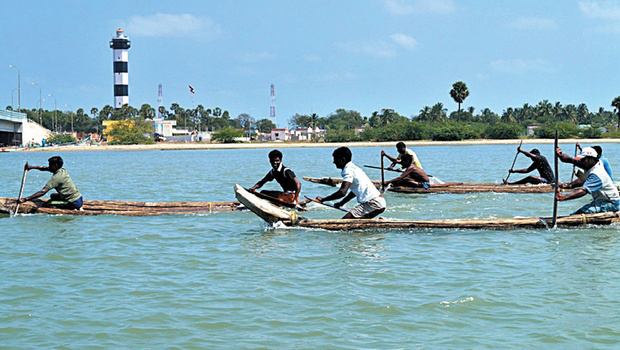|
“Come, let us gather our nets from the shore and set our catamarans free,
To capture the leaping wealth of the tide, for we are the kings of the sea!”
- From Coromandel Fishers by Sarojini Naidu

Pulicat lighthouse and racing catamarans. (Courtesy: New Indian Express.)
In the winters of the mid-1960s, I used to spend a week at Pulicat every year with my Zoology students from Madras Christian College, doing field studies on the rich fisheries and rare biodiversity of the virgin Pulicat Lagoon. At nights, we used to sleep on the high and broad verandahs of the warehouse left behind by the Dutch in the 17th Century. While the students slept exhausted after a day’s and late night’s collection of prawns, crabs, fish and oysters, I lay awake to watch the panoramic midnight scenario play out on the backwaters.
I would muse about the Dutch days in Fort Geldria, protected by its moat, now dilapidated and reduced to heaps of rubble, overgrown and choked with thick and thorny bushes of the veli kathaan (Prosopis), infested with snakes. I would think about the lives of those who lay buried in the 70 tombs of the Dutch cemetery. And I would try to recall the exciting history of the Dutch at Pulicat.
The old and antique lighthouse in front of the warehouse, but across the vast stretch of backwaters, would flash its beams rhythmically all through the night, glittering in the backwaters and revealing the silhouettes of the occasional fishermen manoeuvring their country boats and nets in the night. When the beam of the lighthouse passed over the beautiful tall palmyra trees and the swaying casuarina groves around the fishing hamlets, and on the tall mausoleums in the Dutch cemetery, I would get glimpses of the kaleidoscopic panorama of the Pulicat backwaters at night. Packs of jackals would be hunting at the farther edge of the backwaters for ‘ghost crabs’, so called because of their huge size, weird appearance and emergence from their burrows on the shore only at night.
On a Full Moon night, the moon would rise early on the eastern horizon over the edge of the ocean far beyond the lighthouse, and as it rose to the level of the lighthouse beams, the unrivalled beauty of God’s moon, between the silvery clouds above and the dark ocean below, excelling the beauty of the man-made lighthouse beams, it was an ecstasy to watch.
Huge sail-boats, 30-50 feet long, with heavy cargo of salt, rice bags, casuarina poles, lime shells and even cattle, plied slowly down the moon-lit backwaters, leading southwards on the Buckingham Canal to Madras. The lone boatman at the helm of each boat would keep singing a melancholic boat song in the moonlight, occasionally yelling aloud to the other boatmen in the dark to guide them too. On the top of the mountainous cargo, in a small makeshift tent with a kerosene lamp, women would cook their midnight meal of rice and fish curry.
Lake fishermen anchored their padagu (plank boats) in the shallower backwaters to lay their traditional suthu valai (encircling net) at midnight for prawns that drifted along the high tide. Sea fishermen, on the other hand, kept landing their catches all through the night at the fish market, just opposite the Dutch cemetery.
In the stillness of the night, I could hear the booming of the distant ocean, the howling of the jackals on the beach, the barking of the fighting village dogs all around and, occasionally, the quacking calls of the foraging sea gulls, night herons and egrets (kokku), flying low across the backwaters.
As the lighthouse switched off at the dawn, I would awaken from my sleepless trance and wake up my students, to get them ready for another day's hard field work by the Pulicat Lake, that would help achieve ecological and economic stability and prosperity in the Lagoon, for posterity.
Spending a night alone on the Pulicat backwaters was like drawing nearer to God.
As the American nature-poet, Ralph Waldo Emerson, writes in his essay on ‘Nature’:
“When a man is alone …. he can feel himself being one with the nature, as a result of which he can also feel the presence of God with him and all around him.”
|

